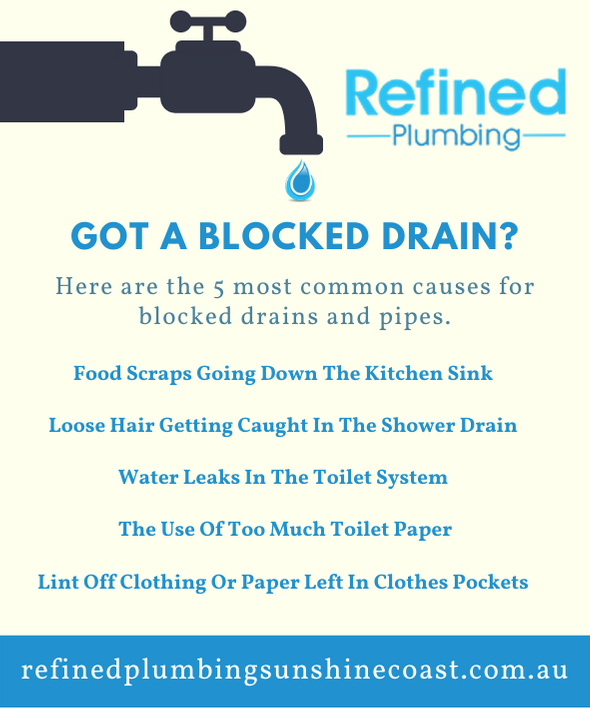How to Know When Your Sewer Line is Clogged
- Written by NewsServices.com
A clogged sewer line is a serious problem and if you do not notice the signs quickly enough, it can become a costly issue. The repairs can be expensive and while you are working on those, you may find that your family is exposed to contaminated water. So how do you know if your sewer line is clogged?

Is there a Clog in Your Main Sewer Line?
Your home has many drain lines that carry wastewater from your shower, toilet, bathtub and sinks and they all drain to a main sewer line. This is a larger pipe that takes all the waste away from your home to the city sewer or, if you are on septic, to your septic tank. When your main sewer line is clogged, all your home’s drains will start to back up and this can cause more issues such as leaky pipes and water damage.
Even if you are very handy around the house with many types of repairs, fixing a sewer line clog is not something that most people are able to repair. The reason is that these lines are located low below the ground away from your home. You need special tools and equipment along with an experienced professional that can use them.
Warning Signs of a Clogged Sewer Line
The average sewer line is between four and six inches around. Clogs are quite rare but when they happen you can be assured that there is a serious problem with your plumbing system. Common causes of clogs are damage to sewer lines, bends in pipes or a collapsed pipe. This type of damage can prevent the waste from moving through the line and draining out. There are many different things that can affect your sewer line, including:
-
* Corroded pipes
-
* Construction occurring near the sewer line.
-
* Soil movement around your sewer line.
-
* Pipe joints are damaged.
-
* Heavy weight above your pipes such as vehicles.
Main Causes of Sewer Line Clogs
Sewer lines can become clogged if they are quite old and have sagged. When the pipe has a bend in it, debris can collect, and this leads to a clog. The most common type of sewer line clog is from a build up of a combination of grease and fat. When you pour oils, fat and grease down your sink, it will cool and harden and if you try to run hot water to melt the grease, the water will cool sufficiently to allow the grease to cool, and it will harden long before it reaches the main sewer line. The fat then sticks to the main sewer line, causing a serious clog.
“Flushable” wipes, feminine sanitary products and other bulky items that are flushed down the toilet can also cause clogs. You should never flush anything down the toilet other than human waste and toilet paper.
Another major cause of clogged sewer pipes is tree roots. As trees grow, their roots spread in search of nutrition. Even the smallest roots can move into sewer pipes and cause a problem. You might not notice any issues at first but over time the roots will clog the drain and break it up. As roots continue their growth, they start to form a mass and sewage and waste water cannot pass through.

Image from https://refinedplumbingsunshinecoast.com.au/
Main Signs of a Clog
Sewer clogs happen slowly and if you can identify a smaller issue before it becomes a big one, you will be far ahead of the game. Here are some things you should look for which are an indication of a sewage clog:
-
Sewage in Floor Drain – If your pipes are clogged, the waste water has nowhere to go. Soon you will see and smell the sewage as it comes up through your drains.
-
Dark water – as water backs up from a main drain clog, it moves back and to the lowest point of entry. This can be the tub, floor drain, shower or your basement. This water will not be clear like water that comes from a leaky pipe, instead it will be dark and smelly. This water may even contain raw sewage so you should be very careful around it.
-
Water back up – if your water backs up when you flush your toilet or have a shower, you have a blockage in your main sewer pipe.
-
Slow moving drains – if your drains do not operate properly, you likely have a clogged sewer drain.
-
Gurgling noises – when your main sewer is not operating correctly you can get some strange sounds from your plumbing system. Bubbles can from you flushing your toilet, running your sink or operating a washing machine. This all moves around in the pipes but does not drain correctly, so it makes noise.
If you think that your sewer line is clogged, turn off the water immediately. This will stop the situation from getting worse. To do this you need to find your water main and turn off the main valve. It is usually a large handle, lever or wheel which you will turn until it is off. Call a professional plumbing company to inspect and deal with your clogged sewer pipe. A plumber will have the right equipment and knowledge to repair and correct your problem.
Read more about blocked drains



